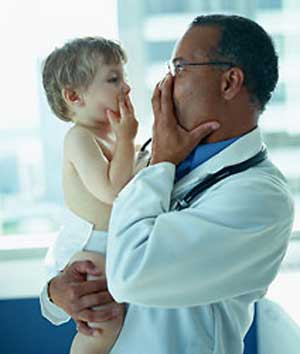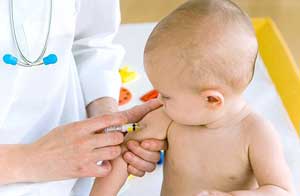Paediatrician
Tasks & duties

Paediatricians may do some or all of the following:
-
talk to patients and/or their caregivers
-
discuss patients' medical and developmental problems with patients and/or their caregivers
-
study patients' medical history
-
examine patients and carry out tests
-
use the results of tests and examinations to decide on treatments
-
prescribe and give medicine and other treatments
-
carry out certain procedures for diagnosis or care such as attaching life-supporting equipment
-
monitor results of treatment
-
advise patients and/or their caregivers on health care programmes
-
investigate causes of diseases
-
liaise with community services
-
advocate for nationwide health programmes beneficial to children and adolescents such as immunisation or healthy eating programmes
-
work and liaise with other health professionals to provide total health care for patients
-
be involved in social paediatrics and examine patients for any sign of child abuse
Specialisations
Most paediatricians in New Zealand are general paediatricians. Consultant general paediatricians often develop a speciality interest area focusing on illnesses such as diabetes or respiratory disorders. The following paediatric specialisations are recognised by the Royal Australasian College of Physicians:
Community Child Health
Assess social and physical environmental factors affecting the growth and development of young people whether well, ill, impaired or disabled, generally in community-based or government child health services.
General Paediatrics
Diagnosis and management of infants, children and adolescents with undifferentiated and complex conditions.
Paediatric Emergency Medicine
Diagnosis and management of acute/emergency paediatric problems.
Paediatric Rehabilitation Medicine
Management of disability arising from impairments in children and adolescents.
Paediatrics and Child and Adolescent Psychiatry
Diagnosis and management of children and adolescents with psychological difficulties.
Skills & knowledge

Paediatricians need to have:
-
communication and people skills to relate well to children and their families, specialists and other colleagues
-
knowledge of medical and developmental problems that may affect children and adolescents
-
knowledge of medicines and treatments and the effect these have on patients
-
an awareness and understanding of other cultures and their attitudes to medical treatment
-
an understanding of the impact of family dynamics and social factors on children
- knowledge of anatomy and how the human body works
- knowledge of different diseases and illnesses
- diagnostic skills
- knowledge of how to access community support for patients and their families
- knowledge of medical ethics and law
- analytical and interpreting skills
- decision-making and problem-solving skills
- organisational and time management skills
- report writing skills
- up-to-date knowledge of new research, treatments and practices
Entry requirements
To become a paediatrician you need to complete a Bachelor of Medicine and Bachelor of Surgery (MbChB) and spend at least two years as a junior house surgeon in a hospital. You must then complete six years of specialist paediatrics training and examinations to become a Fellow of the Royal Australasian College of Physicians (RACP).
Secondary education
A tertiary entrance qualification is required to enter further training. Useful subjects include Bursary or NCEA equivalent maths, chemistry, physics, biology and English.
Tertiary Education
To enter the MbChB you need to complete the first year of a Bachelor of Health Science or a Bachelor of Science (Biomedical), and take the Undergraduate Medicine and Health (UMAT) admission tests, where up to one-third of your first year final grade is determined by non-academic achievements.
Alternatively you can complete a related health sciences degree and apply for graduate entry to the MbChB programme. Graduate applicants must also take the UMAT admission test.
Training on the job
Paediatricians must take part in continuing education courses through their fellowship college. In the programme administered by the Royal Australasian College of Physicians paediatricians are required to complete a number of educational credits every year. They also need to keep up to date with the latest technology and practices through reading medical journals and using the Internet
Registration
Paediatricians need to be fellows of the Royal Australasian College of Physicians (RACP) and hold vocational registration with the Medical Council of New Zealand.
Useful experience
Any experience working with children is useful for paediatricians.
Related courses
Medical Science
Paediatrics
Surgery
For more information, please refer to Career Services.
Document Actions
